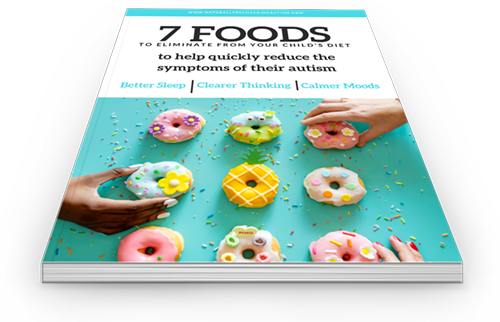Losing weight has far greater challenges if you’re not aware of seven crucial things. Many mothers talk about how their children on the autism spectrum (or they themselves) are having trouble losing weight. Often this difficulty is due to combined factors, beginning with a diet high in sugars and starchy carbohydrates, but other underlying health issues may be contributing as well. 
Weight Loss Checklist
Healthy weight loss is a challenge for children on the autism spectrum. They may be eating what they believe to be a healthy diet and exercising, but still they cannot lose the weight. When this happens, I go through a mental checklist of seven things:
1. Metabolic syndrome
2. Liver congestion
3. Thyroid imbalance
4. Adrenal stress
5. Candida
6. Leptin resistance
7. Brain support
8. Bonus: Mold Biotoxins
Metabolic Syndrome
Metabolic syndrome is an imbalance in your metabolism. Blood sugar levels cannot stabilize and this causes a myriad of other problems in the body. This imbalance can lead to Type II diabetes. Metabolic syndrome is usually caused by a diet high in sugar and bad fats (corn, safflower, sunflower, peanut, canola, and soybean oils). This can also be inherited in utero from the mother’s eating habits. It should be noted that monosodium glutamate or MSG, a flavor enhancer that is added to many foods, is toxic to the brain and contributes to obesity. The same is true for the artificial sweetener aspartame found in many food and beverage items labeled as “diet”. Additionally, when the body has multiple toxins to remove, the liver becomes congested.
The omega 3 fatty acid docosahexaenoic acid (DHA) reduces the risk of metabolic syndrome. DHA reverses insulin resistance, is known to reduce stomach fat, decreases inflammation, and is a necessary component of brain health.
Liver Congestion
Most children on the autism spectrum are born with a congested liver, and most adults have one as well. If the liver cannot remove toxins quickly enough, it cannot do its job of helping to remove excess hormones and keep hormones in balance. Hormone levels are balanced by the liver. The amount of hormone issues a person has often correlates to the health of their liver.
Insulin is a hormone. Insulin allows our body’s cells to absorb glucose, or sugar, from our blood. Glucose stops the body from using fat as energy. A congested liver and fat deposits around this organ cause the liver to become insulin resistant. This causes the body to produce more glucose, raises blood sugar levels and further increases insulin resistance. To further aggravate the situation, once all sugar stores are used up from the liver, your cells will begin to break down protein from your muscles and bones to burn as sugar. In this case, you must reverse this process and re-train your body to burn fat.
Adrenal Stress and Thyroid Imbalance
This vicious glucose cycle triggers the stress response on the adrenal glands. The adrenal glands release the two stress hormones adrenaline and cortisol. A release of these hormones triggers a spike in blood sugar and eventually trains your body to continue burning sugar instead of fat. This constant stress response overworks the adrenal glands and causes extreme fatigue. Eating sugar also triggers the stress response. Weak adrenals lead to a poor functioning thyroid gland, which also reduces the body’s ability to lose weight.
The Right Fat
Today’s modern diet and general medical opinion is that eating less fat and eating more carbohydrates has caused an epidemic in obesity and diabetes. Our bodies need fat, but it must be the right kind of fat. Some good, healthy fats are olive oil, avocado, and coconut oil. Remember that carbohydrates turn to sugar in your body. This is often seen as belly fat or fat around the waist or midline. The real health problem in that case is that there is fat depositing itself around your internal organs and arteries that go to your heart.
Candida Issues
Candida albicans, commonly known as yeast can become overgrown in the gut. When this happens it not only effects the health of our gut, immune system, and brain but our blood sugar, as well. We will crave carbohydrates and sugar because candida uses it as its food supply. Candida also causes the gut to leak and allows for undigested food particles to enter the bloodstream causing inflammation and food allergies. Enzyme production decreases and bloating increases. This all triggers an immune response that alerts the adrenals to affect their own stress response. Worse, because the lining of the gut is damaged, it is not properly absorbing vital nutrients from the foods we eat. We then can become malnourished, even though we are eating, and we remain hungry because our body and brain are starving for nutrition. Candida can also eat up all of the glucose leaving the brain starving for it. This can easily happen at night when we sleep because we’re not feeding the body food so the brain wakes us up to try and get us to eat. This leaves us with sleep issues known as candida induced hypoglycemia.
Leptin Issues
Leptin is the main hormone that regulates both appetite and weight loss by telling your brain when to eat and how much to eat. Mainly it tells your body when to burn fat and when not to. When leptin sensitivity is balanced you will stop storing excess fat, control hunger and food cravings, and lose weight normally. Cutting down on calories is an actual diet of long term self-defeat. This tells our body we are starving and further imbalances leptin, keeping us fat.
Sugar Causes Stress
We are not meant to use sugar as our primary fuel. This comes from a triggered stress response that causes our fat burning hormone, leptin, to become imbalanced. Leptin is produced by your fat cells, and you can become resistant to it over time. The body can be put into a stress response from factors such as improper diet, inflammation, food allergies, stressful environmental factors, toxins, or a brain imbalance that triggers ongoing anxiety. When this happens, adrenaline is released. This contracts blood vessels which deplete the cells of water, sugar, and much needed nutrients. A lack of nutrients causes a feeling of excessive hunger. This signaling to the brain comes from the hormone leptin.
Brain support
Serotonin is the neurotransmitter, (brain messenger), that helps regulate mood, sleep and satiety of appetite. It is commonly depleted in many individuals, especially children on the autism spectrum. Serotonin’s receptors are in the gut. If the digestive tract is unhealthy these receptors cannot provide enough serotonin to the brain. This can cause trouble with sleep, mood swings, and an appetite that is insatiable. Anxiety is common with an unhealthy gut. Histamine intolerance can be a strong culprit.
Mold Biotoxins (Bonus…and very important)
Twenty-nine percent of the world population has a genetic defect that disallows the body to remove toxins when exposed to mold. The immune system reacts by sending out a cascade of inflammation that affects multiple systems of the body. These include the hormonal system which then greatly affects weight. When the mold biotoxin illness is an issue it can cause many symptoms including poor cognition and memory, sleep disorders, and weight gain.
What you can do
What you can do is eat plenty of food, just the right ones in the right combinations. Protein sources in moderation combined with lots of good fats, (yes, that’s right!) and non-starchy vegetables. The good fats are avocado, olive oil, coconut oil, and nuts (except peanuts). Get your FREE download of the top foods to avoid to assist gut healing and weight loss.
Support the liver with a natural detoxification source. A product I have found very helpful with liver support is Liver Detoxification Pathways Elixir. Liver Detox Elixir from the supports both phase I and phase II liver detoxification. This is very important to be sure all toxins are getting expelled from the body and not just brought to a congested liver to process, but can’t excrete.
It takes twenty-one days to rebalance your leptin levels. After this time you may eat foods not on the diet, but within moderation. Once leptin is balanced, you should continue to maintain your weight. Some meal examples are eggs with avocado or chicken with a green salad and olive oil, adding nuts such as almonds, cashews and macadamias. Maintain a reduction or elimination of bad starchy carbohydrates (cereal, cookies, crackers, etc.), sugar, bad fats, monosodium glutamate, or sugar substitutes such as aspartame and sucralose. As you detoxify it will be important to support your liver. Supplementing with milk thistle is excellent for this. Along with the diet probiotics will help to balance the candida in the gut.
If fatigue, hair loss, cold hands and feet and weight gain are concerns have your thyroid levels tested by your health care practitioner. A saliva adrenal test is extremely helpful too. One can be done through your natural health care practitioner. Be sure to get the test that measures saliva at four different times of day. If you would like to do further testing, there is a saliva test from Diagnos-Techs Laboratories that measures your stress hormone (cortisol) levels at four different increments during the day. This test can be done at home or at work, is more accurate than blood testing (92-96%), less invasive than a blood draw, and is more affordable. Their adrenal saliva test also measures your gliadin (gluten) tolerance
Most conventional doctors will measure blood or urine, which only gives one time increment and is far less accurate than saliva testing. Blood tests often allow for false results. To read more in-depth information on saliva testing go to, www.diagnostechs.com, or call (425)251-0596. Most natural practitioners carry this test in their offices, but any practitioner can order one for you by request.
Serotonin is a neurotransmitter responsible for regulating, sleep, appetite and mood regulation. Ask your practitioner about taking the supplement 5HTP to build serotonin levels, and take magnesium daily as low levels of magnesium can cause leptin and insulin resistance, (noted in this episode are sulfation issues with magnesium). Chromium picolinate is a mineral that is helpful in balancing blood glucose levels, reducing hunger cravings and improves the metabolism of carbohydrates. It can be extremely helpful with sugar cravings. Ubiquinol, which is the active form of COQ10, decreases blood glucose levels by over thirty percent, increases metabolism, increases energy helping with mitochondria dysfunction, is an antioxidant, and increases the level of glutathione inside of the cells. Glutathione is the master antioxidant. Zinc also helps to stabilize insulin. It is important when taking any supplements to be sure they are quality supplements for effective results.
Safe natural sweeteners are stevia (without any bad fillers), and monkfruit. Monkfruit can be a great substitute for sugar exchanged at a 1:1 ratio in any recipe. Coconut flour or almond flour are also good substitutes for wheat flour in any recipe. The ratio exchange is also 1:1.
Get Your Free Food Guide!
Quickly Reduce Your Child’s Symptoms of Autism by Eliminating 7 Foods Most People Consume Daily!
The first crucial step of autism recovery is to begin restoring health to the gut and the immune system.
The health of the gut is directly linked to the health of the brain and therefore to the symptoms of autism. In fact, 80% of the immune system comes from the gut so if the gut is not healthy, then the brain can’t thrive, and the immune system is compromised. It’s a vicious cycle, but thankfully, it’s one that we can put an end to by first eliminating harmful foods.
- Harmful Foods: Identify the foods that worsen autism symptoms and understand the science behind their impact.
- Smart Food Choices: Learn about easy dietary swaps that can significantly enhance sleep, clarity of thought, and emotional well-being.
- Practical Implementation: Get valuable tips on how to implement these dietary changes easily and effectively.
This is for informational purposes only and is not meant to diagnose or treat. Every child’s level of recovery is different. No two people are the same. It is never implied that all children will have the same outcome. Results are all based on individual biology and the work that is done. This process takes time and various steps, effort and resources need to be weighed. Our programs are intended to help you become more knowledgeable and guide you to help bring your child a better quality of life, whatever that may be. We want to help by giving great content, direction and strategies that move you forward. Nothing on this page or any of our websites is a promise or guarantee of results or future outcomes. The results on this page and any of our websites are not typical or promised. In fact, there will be people who purchase this and other programs and never put the work into implementing the strategies taught and therefore will achieve little to no results. Our more detailed earnings disclaimer, privacy policy, and terms and conditions for this program and website can be accessed via the links below. We hold ourselves (and you) to a high standard of integrity. We are cheering you on every step of the way.












